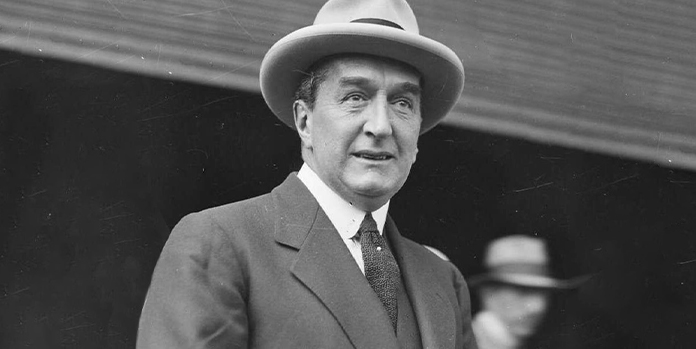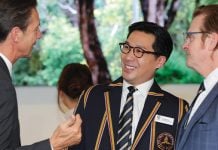This article was written by Marcus Allen, Year 12.
In 1901, the year Australia became an independent nation, the Captain of Melbourne Grammar School was Stanley Melbourne Bruce (OM 1901). He was also Captain of football, cricket, athletics, and rowing.
S. M. Bruce, Captain of the School in 1900 and 1901, left at Christmas, and it is safe to say that no member of the School ever left with a more honourable record. High minded and generous, manly and modest, he earned the respect and esteem of boys and masters. … he rendered distinguished service to the School, and his influence as a prefect was a power for good.
The Melburnian 1902
With that level of achievement and dedication to service, it was hardly surprising that he went on to become Australia’s eighth prime minister in 1923 – a century ago this year.
Scholar, lawyer, soldier, Prime Minister, stateman, educator
Stanley Bruce was a close witness and influential participant to the remarkable first half of the 20th century.
After leaving school, Bruce studied Law at the University of Cambridge, where he rowed in a winning crew in the annual boat race against the University of Oxford. He spent the next ten years managing the family business and practising law in London.
In 1914 Bruce enlisted in the British Army. As a Captain, he led a company at the landing of Gallipoli in April 1915, and was awarded the Military Cross for bravery. In 1916, he received the Croix de Guerre avec Palme, for helping French forces on the Western Front. He was wounded in the knee, discharged in June 1917 and returned to Australia.
Bruce entered Federal Parliament in 1918 and within five years, he became Prime Minister, a position he held until 1929.
His leadership is remembered for his ‘Men, Money, Markets’ policy, aimed to expand Australian industry, trade and migration. In the tumult of the Great Depression in 1929, he also became the first Prime Minister to lose his seat in an election.
After politics, Bruce maintained a commitment to serve his country. In 1933 he was appointed Australian High Commissioner to the United Kingdom, a posting he held until 1945. It was in this capacity in September 1939 that he would send an urgent cable back home to Australia’s Prime Minister Menzies, informing him that German troops had crossed Poland’s borders. Australia was at war.
For his decades of service through war and peace, he was made a Viscount in 1947 and was the first Australian to sit in the British House of Lords.
His final appointment was in service to education, as the inaugural Chancellor of the newly established Australian National University from 1951 to 1961.
Stanley Melbourne Bruce died in 1967, after a lifetime of storied and distinguished service for his country.
A House befitting his career of service
In 1952 Melbourne Grammar School recognised Bruce’s career achievements with a new House named in his honour. The motto for Bruce house is the same as on the Bruce family Crest and Coat of Arms – ‘FUIMUS FIDELES’ – which translates to ‘We have been faithful’. The mascot of the house is the lion, a fitting characterisation of the man himself.



